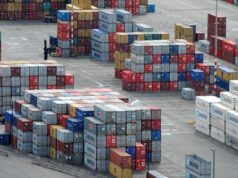
- The World Customs Organization and International Association of Ports and Harbors have released cooperation guidelines between Customs and port authorities
- The guidelines focus on improving collaboration, data sharing and digital technology to streamline international trade and enhance supply chain security
- WCO deputy secretary general Ricardo Treviño Chapa emphasized the importance of digitalization, while International Association of Ports and Harbors’ managing director Patrick Verhoeven highlighted the need for data sharing to optimize port operations and boost trade facilitation
The World Customs Organization (WCO) and the International Association of Ports and Harbors (IAPH) released cooperation guidelines between Customs and port authorities.
The guidelines, unveiled at the IAPH 2023 World Ports Conference’s opening in Abu Dhabi, are designed to foster cooperation, facilitate data sharing, and embrace digitalization in customs and port operations.
They aim to help customs and port authorities work together more effectively by sharing data and using digital technology, WCO said in a statement. They encourage better teamwork, data rules, and understanding each other’s core activities. They primarily focus on making data digital, improving processes, and using technology for smoother operations.
A central feature of the guidelines is the emphasis on interoperability between the automated systems of customs and ports to enable the seamless submission of logistic and operational data. The objective is to make it easier for businesses to move their goods across borders, following the rules set by the WCO and the International Maritime Organization (IMO).
At the conference, Ricardo Treviño Chapa, deputy secretary general of WCO, talked about the importance of using technology in global trade. He said, “The WCO has long advocated for digitalization in cross-border trade procedures, developing standards to facilitate the process. This includes a Data Model encompassing Customs procedures and those under the purview of international organizations.”
In addition, Chapa mentioned they are working with the IMO to update the IMO Compendium on Facilitation and Electronic Business, with the goal of making customs and port digital systems work together better.
Chapa emphasized it is now up to customs administrations and port authorities to advance the digitalization agenda. The cooperation plan provides insights on how to improve customs operations at ports and ensure consistency with the WCO Data Model.
IAPH’s managing director, Patrick Verhoeven, added sharing information is crucial to making ships’ visits to ports more efficient.
He said, “In our own project to identify gaps in global port infrastructure last year, our principle finding on trade facilitation was the issue of trust and the challenge of sharing data in a collaborative manner between port community stakeholders to optimize a vessel port call and minimize berth waiting time.”
Furthermore, Verhoeven said that by establishing a shared plan and a reliable system for exchanging accurate information, ports and customs authorities can enhance supply chain security. This, in turn, will lead to improved trade facilitation in their respective countries.
The guidelines are a big step toward making global trade smoother and safer in logistics and shipping. As customs and port authorities worldwide follow these suggestions, international trade should become more efficient, clear, and secure. This will benefit businesses and economies globally.
RELATED READ: WCO forum discusses impact of e-commerce on Customs valuation








